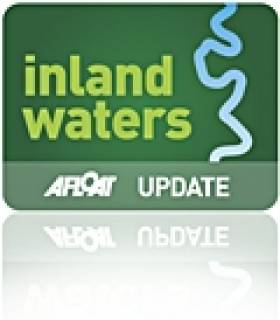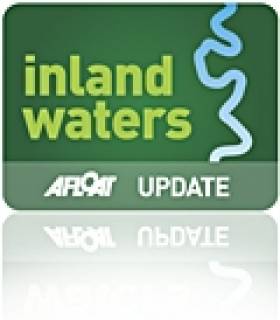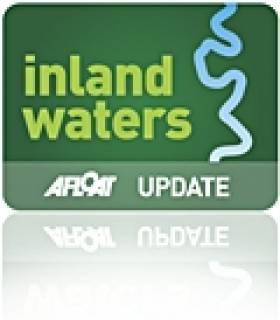Displaying items by tag: Shannon river
#cityone – An international and local team of boat builders and naval architects have assembled at the Ilen School, Roxboro, as part of the Limerick City of Culture 2014 celebrations. The school is well underway towards the rollout of its Limerick City of Culture Sport and Legacy Project, which involves, as Afloat reported earlier the design and build of a new innovative sailing dinghy for Limerick City and a fleet of new 23′ rowing Gandelows.
The school, which is devoted to excellence in teaching and learning through the medium of boat building and related crafts, offers to the local and wider community, direct involvement in boat building, rowing, sailing or visits to the school workshop, to see at first hand the ongoing work.
New 'City One' Sailing Dinghy Design Built for Limerick's River Shannon
#cityone – A new Irish sailing dinghy design, the LC1, is under construction in Limerick which promoters say will have a 'lively performance but at the same time, the relatively broad beam and inherent stability should mean it is not difficult for the inexperienced.
The City One Limerick Dinghy from the AK. Ilen Company is designed for use on the Shannon as it passes through the city and opens into estuary on its way to the Atlantic. The LC1's launch will tie in with celebrations of Limerick's 2014 City of Culture celebrtations.
The design of the boat is from the drawing board of Theo Rye.
The keel of the LC1 is laid and according to the latest progress reports the keel of the prototype is laid, and within the next few weeks, some of the world's 'finest craftsmen' from New Zealand, North America and elsewhere will be in the Ilen Boat Building School working in conjunction with Limerick's boatmen on the project.
The design marries traditional and modern design elements. Most modern dinghies are factory made in fiberglass or plastic. The LC1's hull is specifically for relatively simple construction in timber and plywood with a hard chine and constant radius underside.
Many thousands of dinghies of this type were built in the 1950s and 60s, often by amateurs at home. The relative simplicity of the design means no especially difficult boatbuilding skills will be necessary, so the satisfaction of construction is brought into the reach of nearly anyone with enthusiasm and time. The pride of achievement in helping build a boat and then sailing it will excite and interest children and adults, and there are numerous benefits and educational opportunities associated with this process. The materials specified are reasonably cheap and easy to source.
The use of epoxy to coat the timber and fillet the ply together, and the painted finish, will help reduce the maintenance and upkeep often associated with wooden boats, and any repairs necessary should be simple to do as well. The design is also intended to quickly self-drain after righting from a capsize, a feature of many modern designs; "coming up dry" has the benefit of allowing the boats to be left safely on moorings afloat without covers if necessary.
The raked stem reflects that this design is not driven by a rating rule;the stem allows the bow to retain buoyancy when driven hard, and it often means a less abrupt stop in the event of a collision, too. That points to the intention that the boat should be user friendly both for novices as well as more experienced sailors.
In the right hands, the design should enable lively performance and keen racing; but at the same time, the relatively broad beam and
inherent stability should mean it is not difficult or intimidating for the inexperienced or less confident.
The hull shape is intended to be tolerant of crew weight, and allow crews of two, three or even four people, making it a design suitable for teaching sailing with an instructor on board. The high boom and "gnav" mean there is less likelihood of knocking heads with the boom or kicking-strap, and the clear Mylar sails enable good visibility.
The size of the jib is such that even relatively small crew members should find it easy to trim, and without a trapeze no special athleticism is required. The simple layout and lack of complexity in the rig should also mean rigging is quick and easy, helping get people onto the water rapidly and easily.
The Shannon river has always been central to the history and life of Limerick, and sailing right in the center of the city should reawaken an awareness of its fundamental marine and riverine dimension and perspective.
The unique topography of the area brings its own challenges: balancing the need for a relatively generous sail plan to keep the boat moving in the lee of the city buildings with the requirement for a user-friendly and safe boat to sail in relatively confined waters.
The confines of the river mean short legs and lots of manoeuvres, so the hull is rockered to enable quick tacks; there is no spinnaker. The design is also intended for safety in less sheltered waters like the lower Shannon estuary. The relatively high freeboard and built in buoyancy should make it safe under reasonable conditions on any stretch of water from sea to lake to river.
More on this from the AK. Ilen Company here: www.ilen.ie
River Shannon Film Nominated for Award
#waterwaysireland – The highly acclaimed nature documentary The Secret Life of the Shannon has been nominated for awards for Best Wildlife Habitat Program, Best Presenter-Led Program and Best Editing for at the world's leading Wildlife Film Festival - Jackson Hole in Wyoming USA.
The Irish documentary by Crossing the Line Films saw off competition from over 500 of the best international wildlife films to receive nominations at this prestigious festival and is nominated alongside the biggest names in the Industry - Disney for their feature film on Chimpanzees, BBC for their Africa & Frozen Planet Series.
The biannual festival brings together the world's best natural history broadcasters, producers and filmmakers and has grown to be the largest and most highly regarded competition of the natural history genre. This year's festival received a record number of submissions competing for their highly coveted awards.
The Shannon documentary brings viewers on a wonderful journey along Ireland's great river, revealing its secretive wild inhabitants in intimate detail. Beautifully filmed, and accompanied by atmospheric score, the film sees presenter Colin Stafford Johnson travel the 340km-long river in his canoe, revealing the beauty of its varied habitats, flora and fauna.
Filmed over two years, it features extraordinary animal behaviour captured with the very latest camera technologies and brings a number of firsts to Irish natural history filmmaking – Daubenton's bats filmed hunting in slow motion; whooper swans filmed in extreme close-up as they fly over the river's great lakes; and a kingfisher fishing underwater, filmed at over 1,000 frames per second. Breathtaking footage reveal the natural world of Ireland as never before.
The Secret Life of the Shannon (titled internationally 'On a River in Ireland') was produced by Crossing the Line in association with RTÉ, with the support of the Broadcasting Authority of Ireland, ESB, Waterways Ireland, the Heritage Council and the Department of Arts, Heritage and the Gaeltacht.
President McAleese Opens 50th Shannon Boat Rally (Pics here)
Over 500 boaters gathered to welcome the President and Dr McAleese. President of the Inland Waterways Association of Ireland. Inland Association president Paul Garland said “The McAleese family is no stranger to the River Shannon. Most of us have had their friendly wave as they pass by and I know that they share that special joy we all have by simply being on the river”
Scroll down for Images
On a typical wet Irish morning, President McAleese officially opened the Inland Waterways Association of Ireland 50th Shannon Boat Rally, Saturday 24th July in Carrick on Shannon.
In her address, the President recalled her first boating experience on Lough Ree – “Martin and I were only baby boaters at that time – as we met our first four foot wave, our son Justin – who had little faith in our boating skills – called on us to contact the coastguard!” Reflecting on the significance of the River Shannon to the towns, villages and communities along its route, the President said “from this silver garland – our river Shannon – you see Ireland from a different perspective”
Over 140 boats, barges and sailing cruisers crewed by over 500 people will spend the next two weeks holidaying on the River Shannon bringing much needed business to the many small towns and villages along the banks of the Shannon. The two largest towns on the river - Carrick on Shannon and Athlone along with Waterways Ireland – have invested significantly in the river’s navigation, harbours and facilities which makes boating a pleasure for the Shannon Rally. The Shannon Rally goes from strength to strength said Commodore of the 50th rally, Donal O’Siocháin, with more and more people choosing to holiday in Ireland on our rivers – year on year.
President McAleese concluded by thanking the IWAI volunteers – “the custodians of the river, the champions of the river – who cherish the river – they have taught us to be careful of the river – to keep it for the next generation.
Commodore Donal O’Siocháin presented President McAleese a specially commissioned Leitrim crystal plate engraved with the rally emblem and a copy of the newly launched book “Stories of a River” - commemorating 50 years of the Shannon Boat Rally. Vice Commodore Tom Meegan presented Dr McAleese with a bottle of single malt Irish whiskey – one of only 292 bottles matured at Kilbeggan’s Locke’s Distillery especially for the Shannon Rally.
The event was attended by Frank Dolan Cathaoirleach Leitrim County Council, County Manager Leitrim County Council - Jackie Maguire, and Waterways Ireland Chief Executive Waterways Ireland - John Martin.
The full text of IWAI President, Paul Garland's speech, and Rally Commodore Donal O'Siocháin's speech follow.
Opening Addresses of IWAI President, Paul Garland
President, Cathaoirleach, Commodore, Ladies and Gentlemen, we are deeply honoured here today by the President, Mary McAleese's attendance as we mark this moment the opening of the 50th Shannon Boat Rally.
The McAleese family are no strangers to the River Shannon. Most of us have had their friendly wave as they pass by and I know that they share that special joy we all have by simply being on the River. We thank them for their continuing support as members of our association.
I would like to thank Leitrim County Council and Lei trim Tourism for all their support and encouragement during my time as President of this association, and to take this opportunity to congratulate them on the recent improvements to Carrick, the county town. I think you will agree it has never looked better.
Since Brian Boru brought a fleet of 300 boats up to Lough Ree from his base in Kincora in 1010 we have had 1000 years of recorded boating on the Shannon. I do not wish to compare the Shannon Boat Rally to a Raid on the Vikings but if the hat fits it's easy enough to add the horns.
Over the intervening years the Shannon and the connected waterways have influenced the many aspects of Irish life, people have lived beside it pre history, it has gone from Battle Field of Vikings to the Motorway of the industrial revolution, early monastic settlements show the holistic attract ion. By the 1930's it was giving a fledgling state electricity. It was in the early 1950's that the Shannon and Canal system saw its biggest threat. Years of decline led the government of the day to propose a Bridge Order, which would repeal the Shannon Navigation Act and allow initially a fixed low level Bridge at Athlone with Tarmonbarry and Roosky to follow. A campaign followed with a series of letters headed "Strangling the Shannon". The great friend of waterways and founder member of this association, Harry Rice, wrote "If a fixed Bridge was built it would lie functioning like so many planks across a Bog drain ,barring the passage of anything much bigger then a Lifeboat. If that happens, the closing ceremony of the Shannon will be preformed to the applause of its suicidal sponsors and the great River will sneak humbly through an ungrateful town that it could have helped to make a thriving city, neglected and forlorn, leaving behind its great future."
I am proud to read the words of our first President and of the insight that was shown by the man. Many of our founders have passed on but the legacy they have left us is celebrated every time we venture forth on what is recognised as the finest River in Europe.
It was not an easy time for these men of vision. They had each put a pound on the table and declared the association formed, Now What? Foremost was the right of navigation and the cruise of the Dragon Sailing Boat "Firedrake" is well recorded as its crew Vincent Delaney and Rory O'Hanlon assisted by the Sean Me Bride insisted with varying degrees of success that the Bridges were opened for their passage. This followed by a mission statement "To encourage water transport, to collaborate with tourism to encourage pleasure boating, to encourage Cruising under Sail and Power, t o publish Guides and compile historical and data records".
The next step was to commission a report into the establishment of a hire boat industry in 1953. Blakes, the Norfolk broads operator, admitted that the weather data was not encouraging and were quoted as saying that the Shannon would need a giant umbrella to make the hire boat business viable. George O’Brien Kennedy was certainly a man ahead of his time - he got me boating in the early 1960s and he was so free with his help that when a man from Guinness called Derek Dann came to his door he gave him the benefit of all his experience. That, coupled with the foresight of Carrick on Shannon people, Leitrim County Council and Fáilte Ireland lead Carrick to the enviable position of one of Inland Boating's Capital.
The campaign continued with improvements by the OPW, the Shannon Erne link, this years opening of the Royal Canal and of course, the planned Ulster Canal that will open Lough Neagh to southern boaters. The largest victory of all for this association is probably the least recognised and that was the establishment of Waterways Ireland under the Good Friday agreement. A well funded dedicated body with the mandate of improving and maintaining our waterways on the island of Ireland. All over Europe governments are slashing waterway authorities budgets, we are not totally unscathed but even compared to our neighbours in England who have lost 162 Million of their funds we are well placed to continue building on the success of recent years. We can never get complacent. Water abstraction, water quality, the need for a single authority are just some of the many issues facing us. Remember that all of our achievements are those of volunteers but today is probably what keeps us all members getting out on the River with friends and family.
A Uachlarain, A Chathaoirlig, A dhaoine Uaisle, Friends
To begin I must thank President McAleese for coming to open our 50th. Shannon Boat Rally. It is delightful to see the interest she shows in our inland waterways.
This Association was born in conflict, and that same conflict led to the institution of the first Shannon Rally in 1961. There was apian to use tow bridges for all crossings of the Shannon. This would have stopped all navigation on the river. The first Shannon Boat Rally was a continuation of the campaign to keep the navigation open. In this it was successful but it was successful in more ways than one as the ralliers discovered that this campaigning was fun . And so the Shannon Rally took off.
From the very early days it was decided that the Rally should also include an educational element, and the competitions ensued. The principle behind these was to improve the boat handling skills and knowledge of our members. The competitions have been supremely successful at this, even more so in that the ralliers discovered they also were fun.
Unfortunately many of our early ralliers are no longer with us but I am delighted to see some from the first Rally here with us today. Life was different in the early days. For starters the boats were so much smaller.
It was not unusual to see twelve boats or more in a lock together. Nowadays four is the maximum. Most ralliers camped out at night as they had no facilities for sleeping in the boats. There were many more sailing boats in the early days, indeed one participant in this Rally when entered in the second Rally sailed a dinghy from Athlone to Carrick and back to Athlone in one week, capsizing the boat for every bridge and power line. They were giants of men in those early days! There were also many more sailing and canal boats than we have seen in late years. I am delighted to note that the canal boats are making a welcome return to this historic Rally. It is a pity in ways that we have so few open boats entered in our modern Rallies. I suppose we are all too used to the good life.
The early Rallies had large numbers of boats attending, the second Rally for example had 150 boats. There was the campaigning element here of course, but there was also the fact that Esso gave free petrol to all entrants. I am not sure that all boats would have passed the safety parts of our current boat inspections!
The Shannon Rally goes from strength to strength. We have........boats entered in this Rally and I am looking forward to a great week of fun, competitions, music and companionship. I must finish up by thanking President McAleese for honouring us with her presence today. We are truly grateful. Thank you.
50th Rally Itinerary
The 50th rally begins on Friday 23 July and runs until Sunday 1st August. Boats will travel from all locations to arrive in Lanesborough by Friday evening 23rd for an informal start of the activities.
Friday 23rd July, Lanesborough Get together
Saturday 24th July, Carrick- on-Shannon - Opening of the Rally by President McAleese.
Sunday 25th July Cruise to Portrunny - Boating competitions en rout. Ecumenical service, Commodore’s wine and cheese reception
Monday 26th July Fleet rests at Portrunny - Competitions, dinghy sailing, zorbing, animal farm, table quiz
Tuesday 27th July Cruise to Lough Ree Yacht Club - Boating competitions en route BBQ, fancy dress for children and adults
Wednesday 28th July Fleet rests in LRYC - Competitions, commando competitions, dingy sailing, music, talent competitions for children and adults
Thursday 29th July Cruise to Lakeside Marina - Water sports, dingy sailing, RNLI Auction
Friday 30th July Fleet rests in Lakeside Marina - Land sports, prize giving, dingy sailing, 60’s Rock around the Dock
Saturday 31st July Cruise to Athlone - Informal night
Sunday 1st August Fleet rests in Athlone - Award Dinne, Sheraton Hotel, presentation of Premier and other professional trophies award.
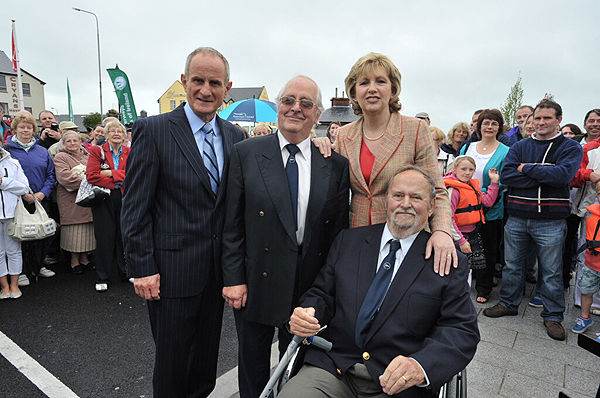
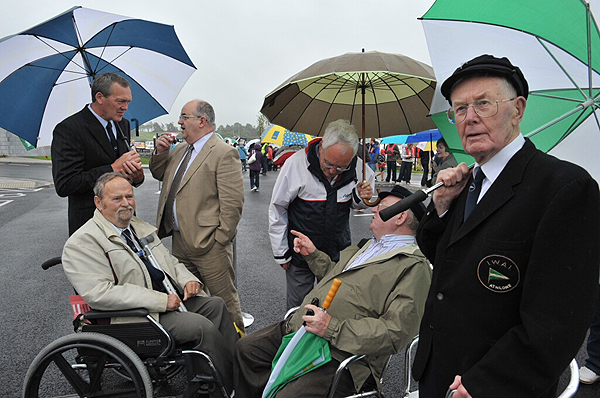
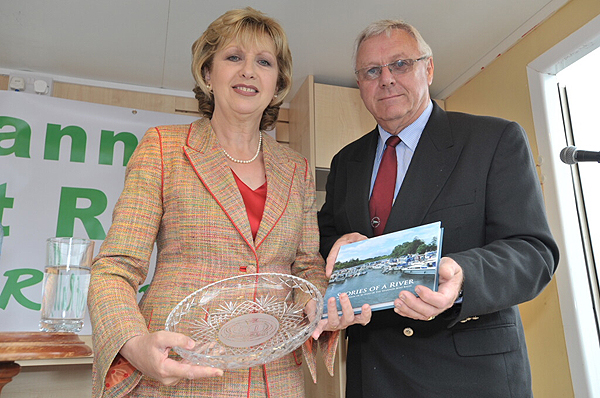
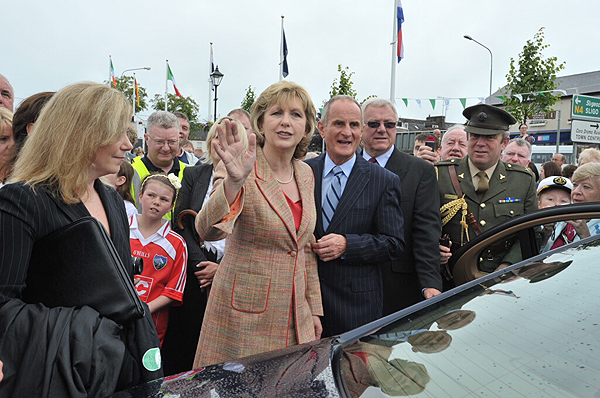
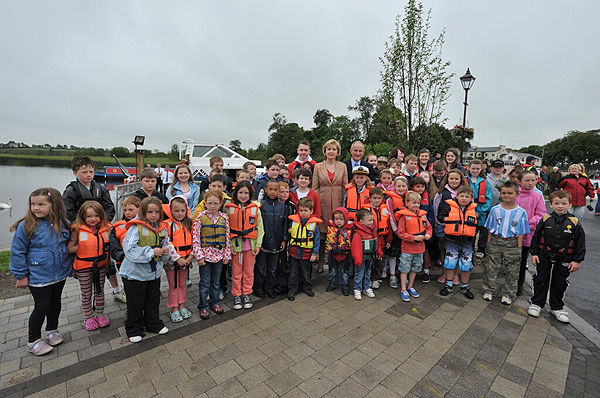
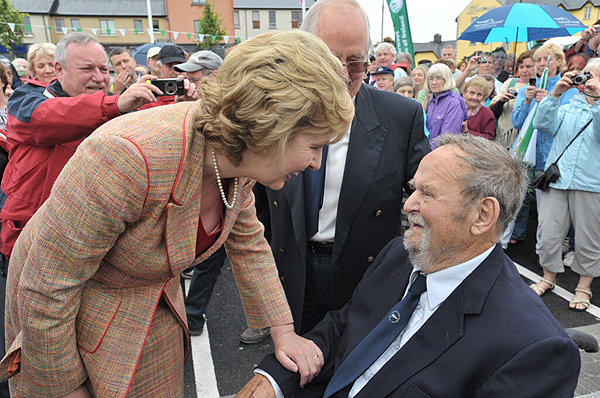
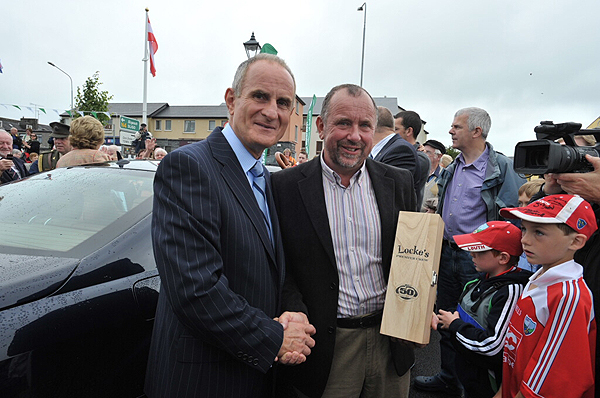
A Taste of the Waterways – Favourite Places to Eat & Drink, 2010
If you’ve never spent a few days lazing around our wonderful inland waterways you just don’t know what you’re missing. It’s a magical world of pottering along, enjoying the wildlife and exploring the unfolding countryside - just sooo relaxing… especially when you have Georgina Campbell’s A Taste of the Waterways guide to hand, to ensure you find all the best pubs and restaurants along the way. You don’t have to set foot in a boat to enjoy the hospitality along our waterways, but it would be a pity to miss out – especially when you have the guidance of a plethora of Waterways Ireland publications and this little gem, written jointly by Georgina Campbell and boating expert W. M. Nixon (sailing Correspondent with the Irish Independent and Contributing Editor of Ireland Afloat magazine).
Published in association with Waterways Ireland, the independently assessed 68-page guide leads visitors along all of our navigable waterways, and to nearly 100 great hostelries and restaurants sprinkled from Limerick up the mighty Shannon via Lough Derg, Lough Ree and the Shannon-Erne Waterway, to Lough Erne; and from Dublin out west along the Royal Canal and the Grand Canal – which also links southwards to the beautiful River Barrow. It’s a world apart and, using this guide and other Waterways Ireland publications such as the ‘What’s On’ guide, you’ll find there’s something for everyone, of all ages.
A Taste of the Waterways is available without charge from Tourist Information Centres and Visitor Attractions along the waterways, and is also distributed to over 60 hotels. To obtain this free publication online, visit www.ireland-guide.com or www.waterwaysireland.org





























